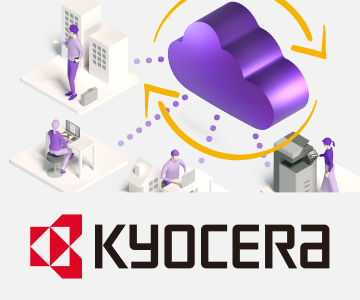Email management: strategies for optimizing your communication
Every day, professionals receive an average of 42 emails, which can lead to chaos and loss of productivity. A structured email organization is crucial in order to use valuable information and improve communication. Special tools help with this.

Email management in the company: Efficient strategies for organizing and using valuable information
On average, 42 emails are received in a work-related mailbox every day, in addition to a high number of outgoing messages. This flood of emails can quickly lead to chaos and affect a company’s productivity. What’s more, emails contain a lot of valuable information and knowledge that needs to be used. However, this potential lies dormant in many companies if employees file emails and the associated attachments without any structure, there are no automated workflows for forwarding emails without media discontinuity, responsibilities are unclear and it is not possible to work on emails together – for example, when it comes to organizing a collective Outlook mailbox. Data protection regulations and the requirements for audit-proof archiving when managing emails make efficient and legally compliant email organization in the company even more difficult.


In order to meet these challenges effectively and to sort and tidy up the email inbox sensibly, a structured email organization in the company is of crucial importance. This can be achieved with special tools that can manage and organize large volumes of emails, from incoming emails to audit-proof archiving. Companies that rely on organized digital email management not only benefit from greater resource efficiency and productivity in day-to-day business and administration, they also improve communication with customers and business partners and thus ensure an optimized customer experience.
Reasons for successful email management

Resource savings and high productivity
The structure provided by special solutions for email organization in the company makes it possible to quickly sort, categorize and prioritize messages and organize the email inbox. This saves a considerable amount of time and significantly reduces the workload for employees, allowing them to concentrate on their value-adding core tasks.
Better overview
A well-structured email inbox guarantees a good overview of incoming messages, unread emails, emails to be processed and pending tasks.
Effective communication
A good e-mail organization in the company improves both internal and external communication because employees can find and share messages and the information they contain quickly and easily.
Less stress
Chaos and a lack of structure in the email inbox increase stress in everyday business life and put additional strain on employees.
Reduced reaction, idle and transport times
The clear categorization of important and less important emails, rule-based automatic forwarding and clearly defined responsibilities make it possible to respond quickly to inquiries and other processes.
Email management software and tools for modern business challenges
Powerful email management software tools are needed to establish an efficient email organization in the company. They are equipped with a wide range of functions that meet the requirements of effective email management and effectively address the challenges of the modern business world.
Information platforms such as nscale form the basis for cross-company data management, which also includes the management of emails. nscale manages all information centrally and in a structured manner, making it possible to automate entire processes and significantly increase efficiency in day-to-day administration and business.
Among other things, nscale provides the following functionalities for the organization of mails:
Email management and organization
Automated sorting, assignment and various options for prioritizing and marking messages.
Advanced filter and search functions
Rule-based automatic forwarding and fast search for emails and information.
Collaboration and sharing
Collaboration functions for the joint processing of e-mails in user groups.
Integration and automation
Seamless integration into calendars, task lists and existing IT systems as well as the option to start automated workflows.
Archiving and analysis
Long-term audit-proof archiving, deadline management and analysis functions for monitoring e-mail usage.

The high flexibility and scalability of nscale make the solution an indispensable tool for efficient email organization in companies, both for small businesses and large corporations. The numerous functions not only make day-to-day work easier for employees, but external stakeholders such as partners and customers also benefit from the optimized communication and high efficiency of a modern email structure within the company.
Self-discipline is also important: tips and rules for email management
Digital technologies make it possible to manage incoming and outgoing messages in a structured and clear manner, organize e-mail filing and tidy up the mailbox. However, employees’ handling of emails is also of crucial importance when it comes to efficient email management.
The following tips and rules can help you to maintain an overview in everyday business and administration:
Regular time slots
Fixed processing times to organize the email inbox and process messages minimize interruptions during actual work. It may even be advisable to temporarily close the email management software or temporarily deactivate notifications of incoming messages.
Clear prioritization
It allows you to organize your e-mail inbox and process associated tasks in order of importance.
Avoid unnecessary emails
These include newsletters and other subscriptions, which further increase the already high number of incoming messages.
Clear folder structure
Even standard email management applications such as Outlook or Thunderbird provide basic functions for structuring an email inbox and organizing the inbox.
Delete or archive
A quick decision on whether an email should be deleted, archived or processed ensures more organization, structure and order. Employees should therefore regularly tidy up their email inbox and organize their email filing.
Using e-mail management tools
Modern email management systems such as nscale offer numerous additional functionalities for the efficient management of emails.
Legally compliant e-mail archiving
There is no specific law that defines the requirements for audit-proof email archiving. The way in which emails must be archived is determined by various legal principles and regulations, including the principles for the proper management and storage of books, records and documents in electronic form and for data access (GoBD), the German Fiscal Code (AO) and the German Commercial Code (HGB). Depending on the industry, there may be additional regulations on legally compliant email archiving. These laws stipulate which emails must be archived, how long they must be stored and which principles must be observed when archiving.

The Verband Organisations- und Informationssysteme e. V. (VOI) has formulated ten guiding principles for legally compliant email archiving. These include legally compliant archiving, the complete recording of relevant emails and early transfer to the archive. Archived emails must correspond to the original, be stored unalterably and access is only permitted for authorized persons.

Furthermore, emails must be retrievable and fully recoverable at all times. Compliance with retention periods is mandatory, whereby the requirements of the GDPR must also be taken into account, as certain emails must be deleted after a specified period of time for data protection reasons.

Changes to archived emails must be logged and it must be possible to restore the original status at any time. Third parties, such as auditors, should be able to view the archiving process. When migrating the email archive, the principles of legally compliant archiving must be strictly adhered to. Audit-proof archiving is crucial for companies in order to meet all requirements.
What exactly is legally compliant
email archiving?
Legally compliant email archiving refers to the process of storing emails for a certain period of time in accordance with email retention requirements. Emails are archived in such a way that the messages are stored securely and in a searchable format. This not only ensures that emails are archived in accordance with legal requirements, it is also possible to restore archived emails.


This is how the law wants it:
the email archiving obligation
The obligation to retain emails guarantees that business communication in companies is properly archived. All messages that are relevant for tax purposes or correspond to a business letter are affected by the obligation to retain emails. The email retention obligation does not apply if the email is only used as a means of transport for an attachment or if it concerns newsletters, advertising emails and similar messages.
What types of emails must be stored?
An archiving obligation for e-mails exists, for example, for invoices and accounting documents, contracts and other legal agreements, business correspondence, offer confirmations, personal information, insurance policies and other e-mails that are relevant under tax or commercial law.
The advantages of our email archiving software
Companies that use software for email archiving benefit from numerous advantages. Not only do they achieve email archiving in accordance with legal requirements, they also establish fast, efficient and automated document management and email archiving. This protects them against data loss and corruption and ensures the integrity of all data and documents in the email archive. Thanks to transparent logging and traceable versioning, the requirements of the email retention obligation are met at all times. This not only reduces the personnel and time required for legally compliant email archiving, but also reduces storage costs for small companies and significantly reduces the load on their email servers.
The functions of nscale at a glance
Archiving emails with Outlook or another standard mail program is practically impossible. This is because such email archiving software is not capable of backing up large volumes of emails. Furthermore, Outlook does not have audit-proof email archiving. This is where an information platform such as nscale comes to the rescue: the solution not only manages all information centrally and in a structured manner and enables a quick search for content, it also serves as archiving software for backing up emails or archiving an Outlook mailbox. The physical storage in the email archive is organized by the nscale archive, which technically supports a large number of proven storage solutions. Thanks to the basic technologies used, the open system architecture and the sophisticated interfaces, the information platform can be easily integrated into almost any existing IT infrastructure. When archiving, nscale stores emails in standard formats, ensuring that messages can still be read decades later.
FAQs
What is email management?
Email is one of the most important communication tools in a professional context. According to the digital association Bitkom, 100 percent of German companies use email as a communication channel. Email management serves to optimize the email structure in the company. It addresses the management of large volumes of incoming and outgoing messages. This primarily includes the structured organization of incoming mail, but aspects such as the most efficient internal and external communication possible and the optimization of business and administrative processes – from incoming e-mail to central filing and audit-proof archiving – are also added values of systematic e-mail management.
Does e-mail management work with Outlook?
It is possible to organize rudimentary email managementin Outlook. The Outlook e-mail manager contains various functions that users can expect from an e-mail management system. They can structure their email inbox in Outlook and organize an Outlook collective mailbox without having to use an additional email management system. However, more powerful email management software is required to leverage all the added value and optimize the email structure in the company.
Why do we need e-mail management?
Without effective email management, it is becoming increasingly challenging for companies to manage the flood of emails and organize email filing. Powerful solutions such as nscale provide a wide range of functionalities to increase business productivity, reduce stress for employees and optimize communication across the company.
Which emails to archive - and which not?
A retention obligation applies to emails if they are relevant under tax or commercial law. Companies should refrain from archiving emails that do not fall into these categories, as well as personal and private messages.
What does audit-proof archiving mean by law?
Audit-proof archiving by law means that the integrity of the messages is guaranteed for the entire archiving period when archiving emails.
How long do companies have to archive emails?
The retention periods for emails are set by law and in most cases are eight or ten years. The retention periods for accounting documents will be reduced to eight years when the Fourth Bureaucracy Relief Act (BEG IV) comes into force on January 1, 2025. How long companies retain emails that are not subject to legal requirements is a matter for them to decide and should be based on their individual needs.
Get in touch.
"*" indicates required fields
Ceyoniq Technology GmbH is a group company of Kyocera Document Solutions.
Ceyoniq Technology GmbH
Boulevard 9 | 33613 Bielefeld
Together we develop strong ideas and implement tailor-made and individual solutions for companies and public administrations – contact us, we look forward to hearing from you!
The digitalization platform: control center of the digital transformation
A digitalization platform is the control center of a company’s digital transformation.

